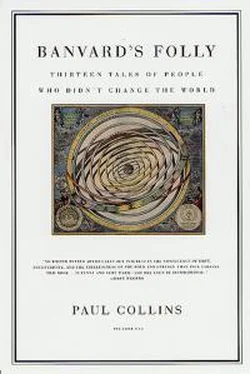Psalmanazar settled into his college room, and lay in his new bed and looked about in contentment--after years of military barracks and borrowed beds, his new home looked enormous to him. Like many of his fellow students, he was
enjoying the first apartment of his own that he had ever had.
Although there had been some notion of his tutoring Oxonians in the Formosan tongue, George assiduously avoided any would-be linguists on campus. Instead, he spent his days sitting in on classes on logic, poetry, divinity, and Newtonian philosophy--what today we would call physics. He loved divinity class, where he could soak in his beloved theological arguments and occasionally bask in attention when the instructor asked him questions about the Formosan religion. But he was bored out of his mind by math class, and
"history, especially ancient chronology andc., appeared so dark, intricate and liable to such insurmountable difficulties, that I never expected to meet any satisfaction in them." George's dismay is understandable. After all, he had just written a spurious best-selling history himself.
His attendance in all his classes was rather poor. Instead, he spent his days hiking around campus, usually with a pronounced limp. He was faking an attack of gout, because "my pretended lameness gave me a kind of gravity, which I was not willing to part with." Concerned patrons sent him to a spa for a cure. Not surprisingly, when he returned to campus his limp was as bad as ever.
George was truly at his happiest in the cathedral, singing with the college's choir. The choir, he later recalled, "was the main thing that captivated my vain, roving fancy, and took up most of my spare hours." He may not have been the finest singer in the choir, but he was probably the most sober. He was appalled that many of his classmates attending choir stumbled in smashed from pre-rehearsal pub warmups at the Turf or the Bear, ready to slur and belch their way through "Ave Maria."
In the evening, after a long day of skipping classes, limping around the quad, and singing pleasant hymns, George was faced by a dilemma: how could he work on the second edition of his book, goof off, and still look like a good student? After his years in the army, he hardly needed to use a bed to catch up on his sleep, and so he soon hit on an admirable solution: I used to light a candle, and let it burn the greatest part of the night, to make my neighbors believe I was plying of my books; and sleeping in my easy chair, left the bed often for a whole week, as I found it to the further surprize of my bed-maker, who could hardly imagine how I could live with so little sleep.
All in all, it was splendid semester--although he didn't learn very much. At the end of it he had finished a second edition of Description of Formosa, with even more outlandish plates than before, gorier details on sacrifice and cannibalism, and thundering denunciations of the critics who had dared to doubt the truthfulness of his first edition. He returned from Oxford to London, manuscript in hand, and disembarked from his carriage at Pall Mall, where he and his mentor Innes had taken lodging.
He's not here anymore, he was told. Innes was now chaplain-general to the English forces in Portugal.
Standing in a London street, Psalmanazar was for a moment the man he had claimed to be all along: a stranger in a strange land, without a true friend in the world.
For a while, the absence of his stage manager scarcely affected George. The second edition of Description of Formosa was a hit once again, and he continued his ruse by publishing a 1707 theological tract titled A Dialogue Between a Japanese and Formosan. He wasted months on end lolling about with London bohemians and noble patrons, indulging their endless appetite for
novelty and details of quaint savage customs. Women, too, seemed strangely drawn to the celebrity cannibal, though George was privately so mortified with shyness that he rarely took advantage of adulterous advances made to him.
"Hardly any man," he admitted later, "who might have enjoyed so great a variety, ever indulged himself in so few instances of the unlawful kind as I have done."
But eventually Londoners tired of their freak, and those who had never believed him much to begin with grew bolder in their attacks. By 1710, skeptical voices were becoming so loud that George's benefactors felt obliged to publish a defensive tract, An Enquiry Into the Objections Against George Psalmanazar of Formosa. But it was too late, as any reader of the Spectator could see when it ran a spoof announcement in its May 16, 1711, issue: On the 1st of April in the theatre on the Haymarket an opera will be performed with the title "The Cruelty of Atreus." N.b. The scene in which Thyestes eats his own children will be played by the famous Mr. Psalmanazar, recently arrived from Formosa; the whole meal will be accompanied by kettle-drums.
Psalmanazar was becoming a joke.
Psalmanazar had spent most of his life--and all his adulthood--in deep disguise, and could hardly go back to the child he had once been. There was nothing left for him, it seemed, but life as a citizen of country and culture that existed nowhere but in his own mind.
Years of dallying about London had left him completely broke, and by 1712 he had been unemployed for so long that his job prospects were grim indeed. But then, one day, an inventor named Pattenden came calling. He'd developed a new white liquid japan--a variety of lacquer that was all the rage among Orient-bedazzled artisans in London. Pattenden had tried selling it, but was meeting with little success. And then he thought, why not hire a Japanese to tout liquid japan? "His proposal," Psalmanazar admitted, "was that I should father and introduce it, under the notion of my having learned and brought the art from Formosa; in which condition, and my putting now and then a hand to painting, he offered me a considerable share in the profit."
George Psalmanazar, washed-up celebrity, had found his first product endorsement. The pair hawked Psalmanazar's White Formosan Work shamelessly, plugging it to anyone who would listen.
--As a japan it is exceedingly white!
--Marvelously hard-drying, gentle friends!
--And unaccountably smooth!
In truth, it wasn't a bad lacquer. But Pattenden became enthralled by his own hyperbole. Whenever he saw a potential sale, he would praise the product outrageously, and then demand so much money for a jar of it that he drove all the customers away. It didn't take long for the whole venture to go bust.
George was left in a deep depression, andwitha nagging feeling that dishonest business was something that he could not stomach anymore.
He tried to go straight; although still halfheartedly maintaining his Formosan habits and accent, he sought out work as a tutor. The problem was, his education had been so lackadaisical that his attempts to teach "empyrical physic" and modern languages met with only the barest success. Fortunately, a
London lawyer took notice of him and hired him as a full-time personal tutor to his children. The eldest son, though, was hopeless at Latin, and George cast about in vain for a topic that he knew anything about that the boy might show some ability at. He became desperate.
Today we will build a berm.
And so the Latin and rhetoric texts were set aside for George's half-remembered teenage classes in military fortifications.
Eventually the job came to an end. The lawyer wasn't very good about paying his tutor fees, and George already had old debts hanging over him. He drifted back into an army regiment in 1715, and followed it around the country. He still cut an unusual figure in the regiment. As noble a savage as ever, he was nicknamed Sir George, and the more gullible soldiers in the outfit actually came to believe that he really had been knighted.
Читать дальше











